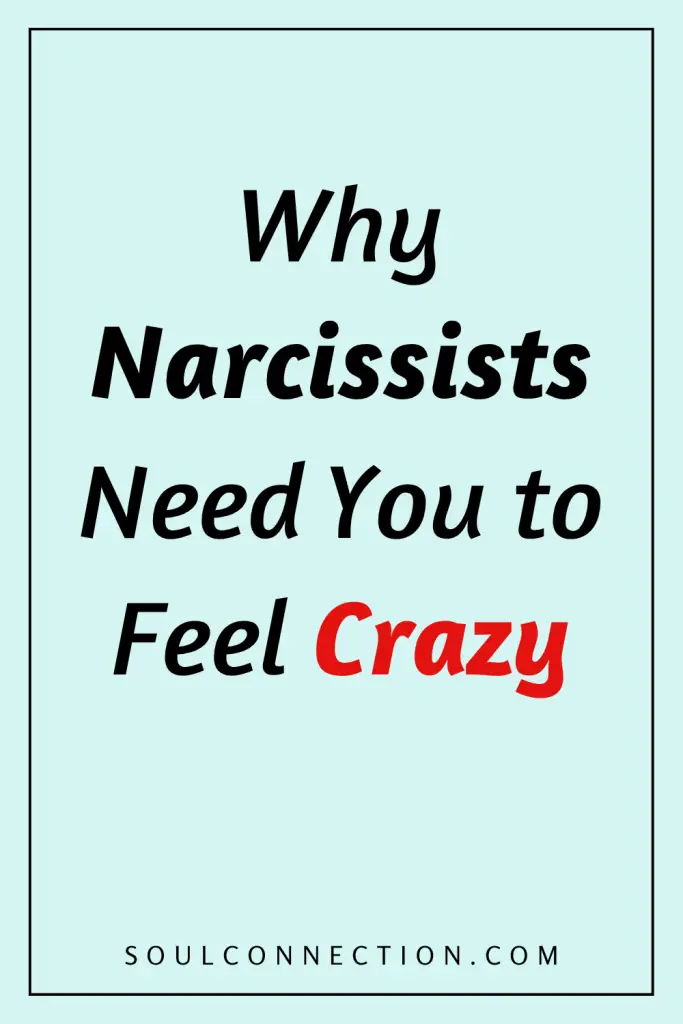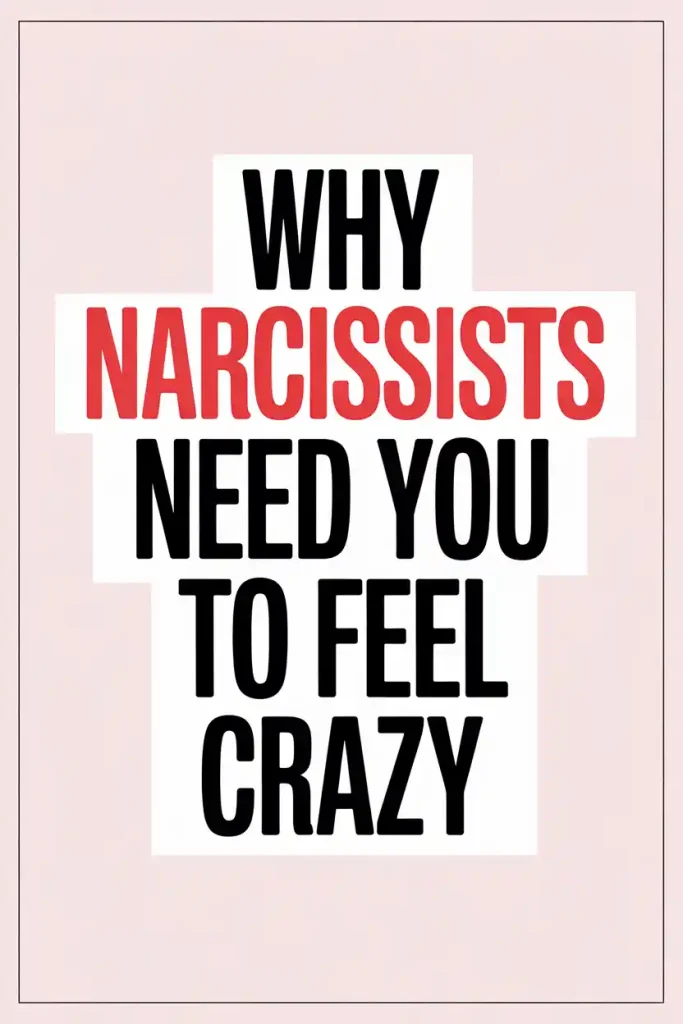Ever tried arguing with someone and left the conversation convinced you’ve misplaced your entire sense of reality? If you’ve ever tangled with a narcissist, you know exactly what I’m talking about.
Suddenly, you’re doubting your own memory, questioning your sanity, and eyeing your toothbrush, wondering if it’s been moved just to mess with you. There’s a reason for that.
Let’s unravel why narcissists seem to need you off-balance, doubting yourself, and—yes—feeling a little bit crazy.
The Narcissist’s Reality: It’s Their World, You’re Just Living in It
Narcissists, bless their delusional hearts, thrive in a world where their version of events is the only one that matters. If reality ever threatens to contradict their carefully constructed narrative, well, reality better look out.
Here comes the magic trick: by making you question your own perceptions, they can keep their story front and center. If you’re busy doubting yourself, you’re not questioning them. Win-win (for them, anyway).
Gaslighting: The Narcissist’s Secret Weapon
Gaslighting isn’t just a buzzword your therapist tosses around—it’s the narcissist’s signature move. They’ll deny things they said five minutes ago, rewrite history, and insist you’re overreacting.
You’ll hear, “I never said that,” or, “You’re too sensitive,” until you’re pondering whether you secretly auditioned for a role in a psychological thriller.
This isn’t accidental. Creating confusion is like home-court advantage for a narcissist.
Self-Doubt Is Narcissistic Super Glue
When you start to question your judgment—Did I really say that? Am I overreacting? Maybe I am the problem—guess who steps in to fill the void?
That’s right: your local, self-appointed expert on everything (the narcissist).
Self-doubt is the glue that keeps you stuck. If you can’t trust yourself, you’ll look to them for answers, for reassurance, for the “truth.” In this way, your confusion secures their control.
Control: It’s the Name of the Game
For narcissists, control isn’t just a perk—it’s the main event. If you’re feeling steady, confident, and sure of yourself, you might start making decisions that threaten their dominance. Can’t have that, now can we?
By spinning you in circles, they make sure you’re too dizzy to walk away or question the rules they’ve set. You’re playing chess while they’re flipping the board.
The Blame Game Gets a Whole New Spin
Narcissists have an allergy to accountability. Owning up to mistakes? That’s for mere mortals. If something goes wrong, you’ll find yourself on the receiving end of some world-class blame-shifting.
If they can keep you questioning your own actions and motives, you become the perfect scapegoat. After all, if you’re always the “crazy” one, then they can stay squeaky clean.
Isolation: The Loneliness of “Maybe It’s Just Me”
Once a narcissist has you doubting yourself, it becomes easier to pull you away from friends, family, and anyone else who might remind you you’re not, in fact, losing your marbles.
You start second-guessing every conversation, worried that others will also think you’re unstable. Before you know it, you’re spending more time with the one person who keeps you feeling off-kilter—the narcissist. Funny how that works.
The Endless Cycle of Apologies
If you’re constantly apologizing for things you can’t remember doing, congratulations: you’re deep in narcissist territory.
They’ll flip the script so well you’ll be the one feeling guilty, even when all you did was ask where the remote went.
This cycle of confusion and self-recrimination keeps you on the back foot, emotionally tired and less likely to challenge them.
Why They Need You to Feel Crazy
Power and validation—the lifeblood of a narcissist. Making you doubt your grasp on reality lets them maintain both. If you’re confused, you’re easier to manipulate.
If you’re emotional, they’ll accuse you of being unstable and use that as proof you can’t be trusted.
It’s less about malice (though it can feel personal) and more about self-preservation. They’ll do just about anything to maintain their illusion of superiority and control, even if it means tossing your mental health under the bus.
Spotting the Signs and Taking Back Control
If the phrase, “Maybe I’m the crazy one,” is becoming your personal mantra, it’s time to hit pause. Here’s what you can do tonight—literally, tonight—to start shifting the dynamic:
- Begin keeping a journal (yes, the old-fashioned way works fine). Jot down conversations, disagreements, and how you feel. It’s harder for someone to rewrite history when you’ve got a record.
- Reach out to someone you trust. One real friend can work wonders for your sense of reality. Even if it feels awkward, say, “Hey, can I run something by you?”
- Set one small boundary today. It doesn’t have to be dramatic—sometimes it’s just finishing a sentence without being interrupted.
- Remind yourself: your feelings are valid. Always. Even if they’re inconvenient for someone else.
- If you’re feeling spun out, take a break—physically step outside, even for five minutes. Fresh air, different scenery, and a moment to gather your thoughts can help reset your brain.
How to Talk to a Narcissist Without Losing Your Mind
Trying to reason with a narcissist can feel like arguing with a brick wall—one that talks back and criticizes your technique. Still, you can minimize the crazy-making.
Stick to the facts, keep your tone calm, and avoid getting drawn into emotional arguments. If they try to twist your words, repeat your point without getting sidetracked. (Think of it as verbal jiu-jitsu.)
Remember, you don’t need to win every argument. Sometimes, refusing to engage is the strongest move.
When You’re Ready to Get Off the Merry-Go-Round
This isn’t easy work. It takes guts, it takes support, and sometimes it takes a professional (therapists are heroes, honestly).
If you’re working up the courage to set bigger boundaries or even leave, honor your own pace. Remind yourself: you’re not crazy, just dealing with someone who benefits when you feel that way.
You deserve relationships where you feel seen, heard, and—imagine this—like you’re not losing your mind. That’s not too much to ask.
Finding Your Way Back to Yourself
Recovering from a narcissist’s mind games often means rebuilding your self-trust from scratch. The good news? You absolutely can.
Celebrate small wins. Each time you speak your truth, each time you trust your gut, each time you reach out for support, you’re taking back a little piece of yourself.
And if you ever catch yourself wondering, “Is it me?”—remember, it’s probably just the residue of someone else’s confusion, not your own.
Your sanity is intact. You’re wiser now, and you know the signs. That, in itself, is a small but mighty victory.


